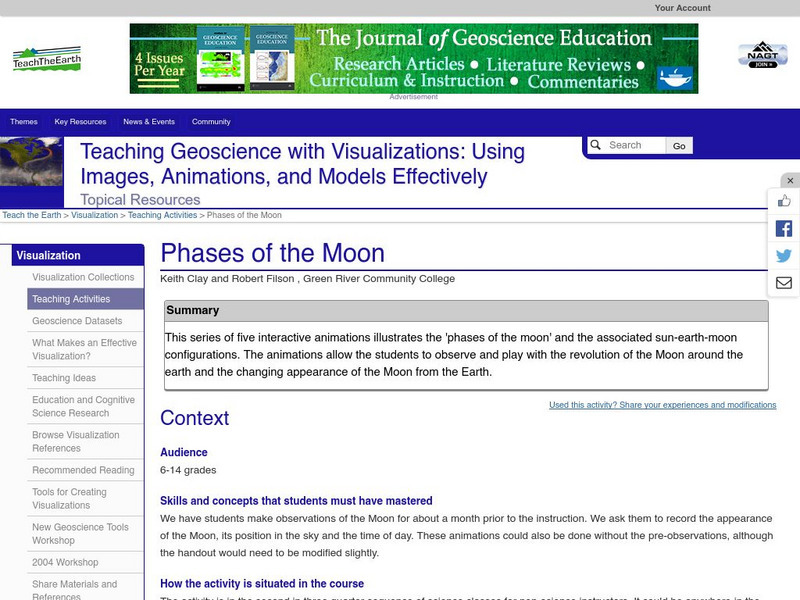Hi, what do you want to do?
Curated OER
Let the North Star Tell You Where You Are
Pupils create an astrolabe and locate the North Star in the night sky. They determine the latitude of the North Star, and calculate an average latitude based on class results.
Curated OER
Let the North Star Tell You Where You Are
Students participate in activities in which they find the Big Dipper and locate the North Star in the night sky, examine the relationship between the angle to Polaris and latitude, and determine latitude by using an astrolabe.
Curated OER
Pattern Detectives
Students discover patterns in language, math and science. They experience patterns by hearing stories, and becoming pattern detectives.
Curated OER
Intermediate Matching – Types of Books
In this book genre instructional activity, students draw a line from the book type words to their definitions. They match nine words, which include dictionary, cookbook, encyclopedia, and fiction, with the definition that best describes it.
Curated OER
Cultural Calendar
Students design their own cultural calendar. For this calendar making lesson, students decide on a culture for a calendar theme and discuss how calendars differ from the US calendar. Students create their own calendar using a...
Curated OER
Vietnam Trade Pact
Young scholars explore world trade issues. In this economics lesson, students read "Opening Doors to Vietnam," and discuss the trade negotiations between Vietnam and the Untied States. Young scholars conduct further research on the topic...
Curated OER
Plant Life Cycle
Fourth graders explore the plant life cycle. They discuss the sequence of events in the life cycle of the plant and illustrate how the life cycle never ends. Students explore the importance of water, sunlight, and nutrients during the...
Curated OER
Life Cycles
Fourth graders explore life cycles. They examine pictures of the various stages of life cycles and put them in the correct order. Students match pictures of eggs to the correct parents. They discuss the importance of knowing the life...
Curated OER
Reasons for Seasons
Young scholars investigate a model of the tilt of the Earth in its relationship to the Sun during the different seasons of the year. They study the solstices and equinoxes, while determining how sunlight hits the Earth with different...
Curated OER
Going Through A Phase
Students are introduced to remote sensing equipment used to gather information about the moon. They learn basic facts about the moon such as size, landforms, temperature and gravitational influence on the earth's tides.
Curated OER
Moon Watch
Third graders read books about the moon and discuss its perceived changes as it moves across the sky. They observe the moon over the course of a month and chart their observations. They discuss their observations and conduct further...
Curated OER
Taking Risks: Drug and Alcohol Abuse
Students discuss a video about drug and alcohol abuse and their connection to risk-taking. They answer questions on a risk factor sheet about the use of tobacco, drugs, and alcohol. They discuss long and short term goals and how not...
Curated OER
Paper Mache Solar System
Students make a model of the solar system. In this solar system lesson plan, students make paper mache models of the planets to hand in the classroom, measure the distance to each planet scaled with footsteps, and model the moon's...
Curated OER
Charting the Moon
Sixth graders observe changes in the moon's appearance over a month and keep records of their observations. They write a plan for recording what they see, and a paragraph reflecting on what they have learned over the course of the month.
Curated OER
Secrets of the Ocean Realm - In the School "Star Gardens"
Students learn to use a tide table in plotting tidal curves and create a tide calendar by plotting a month-long tidal curve on an ordinary pictorial calendar.
Curated OER
Your Day as a Cycle
Fourth graders investigate several cycles such as life cycles, and the moon cycle. They examine the sequences and patterns that are associated with daily life by keeping a daily journal for three days, and comparing it with others....
Curated OER
The Moon is made of Cheese
Eighth graders explore the reasons why they believe scientific ideas are true. They think critically rather than accept everything they are told without question.
Curated OER
Sunrise/Sunset
Students apply data from a weather-related website to predict patterns in the sunrise and sunset.
Curated OER
Participants are challenged to create several different sorting groups for the set of images.
Young scholars examine the influence of interaction with other cultures and the environment in relation to calendars. They also look at the origins of the calendar we use every day.
Curated OER
Arranging the Elements
Learners describe how elements are arranged in the periodic table. They compare metals, nonmetals, and metalloids based on their properties and on their location in the periodic table. Finally, students identify and describe the...
Curated OER
The Vocabulary of Space
Students build their knowledge and understanding of vocabulary related to space. In this space instructional activity, students discuss four categories of words and phrases related to space.
Cornell University
Cornell University: Astronomy: The Phases of the Moon
This site from Cornell University provides great information on the different phases of the moon. As the Moon moves in its orbit around the Sun, our view of the side illuminated by the Sun changes. Furthermore, the rising and setting...
Science Education Resource Center at Carleton College
Serc: Phases of the Moon
An interactive activity where students observe the different phases of the moon. Activity is part of a lesson that includes background information, instructions, and quiz.
Other popular searches
- The Phases of the Moon
- The Phases of Moon
- Science Phases of the Moon
- 8 Phases of the Moon
- Phases of the Moon Journal
- P Phases of the Moon
- Phases of the Moon Worksheet




























